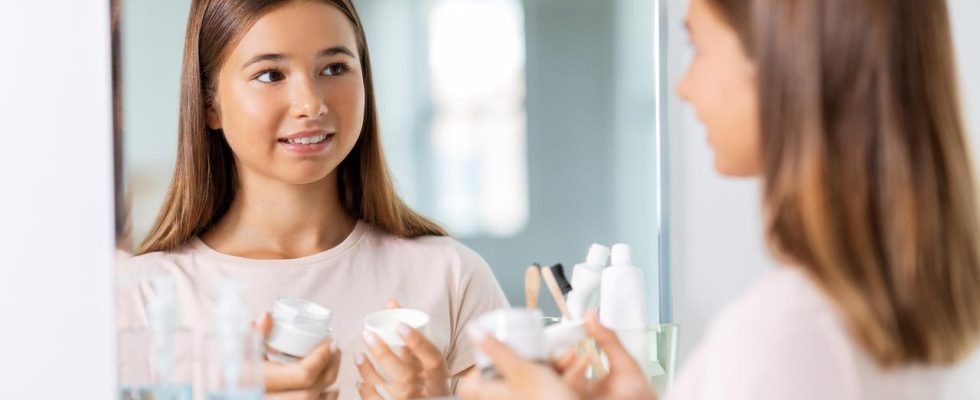Influencers are showing the way: Children now use wrinkle cream, anti-aging serum, etc. A Swedish pharmacy chain has now introduced a ban on the sale of such products to those under 15.
13-year-old Lisa stands in front of a shelf of skin creams in a shop in central Stockholm. She is on a shopping trip with her mother; the teenager just had her birthday. Here in the cosmetics store Lisa can buy anything she wants.
But that is no longer the case everywhere. In the branches of Sweden’s top-selling pharmacy chain, certain skin care products are now taboo for children under 15 years of age. These include wrinkle creams and other products for mature skin.
“Harmful to children”
“It is harmful for children to use such strong products,” says pharmacist Hajer Alsaleh, who works in a pharmacy in the Södermalm district. In young people, the protective layer of the skin has not yet fully developed. “And some ingredients, vitamin A for example, damage this skin barrier. That’s why we don’t want children to use them.”
Alsaleh takes a serum off the shelf that promises to reduce age spots. The ingredients: vitamin C, hyaluronic acid and an enzyme with a peeling effect. The serum is often advertised on TikTok, she says. It is not unusual for young girls to use it.
Anna Josefson emphasizes that these products are not suitable for children. She is chairwoman of the Swedish dermatologists’ association SSDV and senior physician at the University Hospital in Örebro. “Children’s skin is more sensitive to irritating substances,” says Josefson. “Anything that irritates the skin can lead to dermatitis, eczema.”
Once a skin infection has developed, those affected are also more susceptible to a contact allergy because the outer protective layer of the skin has already been damaged. Children without skin problems don’t need any care at all other than sunscreen in summer, says the dermatologist. Pharmacist Alsaleh recommends a mild soap and moisturizer.
“Ban makes it easier for parents”
The trend that young children are using many more products, which they are inspired to buy on social media, among other things, is worrying many dermatologists. Others, like Lars Norlén, senior physician in dermatology at Karolinska University Hospital in Stockholm, see no problem. “It’s not like we’re getting a lot of new cases of young patients linked to the use of skin care products,” Norlén told Swedish television.
Lisa’s mother is still happy that the ban on sales in the pharmacy chain has brought attention to the issue. “I think it’s good that there is an age limit,” says Malin Hallström. “Social media puts a lot of pressure on our children, and it’s not easy for us parents to counter it.”
If sellers issued a ban or at least a recommendation, it would make it easier for parents to talk to their children about the fact that they don’t actually need these products. “Then it’s experts who say that, and not just the mother.”
“Important to set an example”
While other pharmacies in Sweden are also considering a ban on younger children, major cosmetics sellers are hesitant – even though the industry is now debating the issue.
Children in Sweden still have many opportunities to get wrinkle cream and the like online and in beauty stores. So does the age limit in the pharmacy really make a difference?
Pharmacist Alsaleh hopes at least for a signal effect. “We’re not the biggest drop-in center for kids,” she admits. “But we hope that the ban will start a discussion. And that the providers where children shop most will live up to their responsibility and introduce a ban.” It’s important to set an example, says Alsaleh – even if the trend may not be stopped.
Julia Waschenbach, ARD Stockholm, tagesschau, March 27, 2024 10:57 a.m

